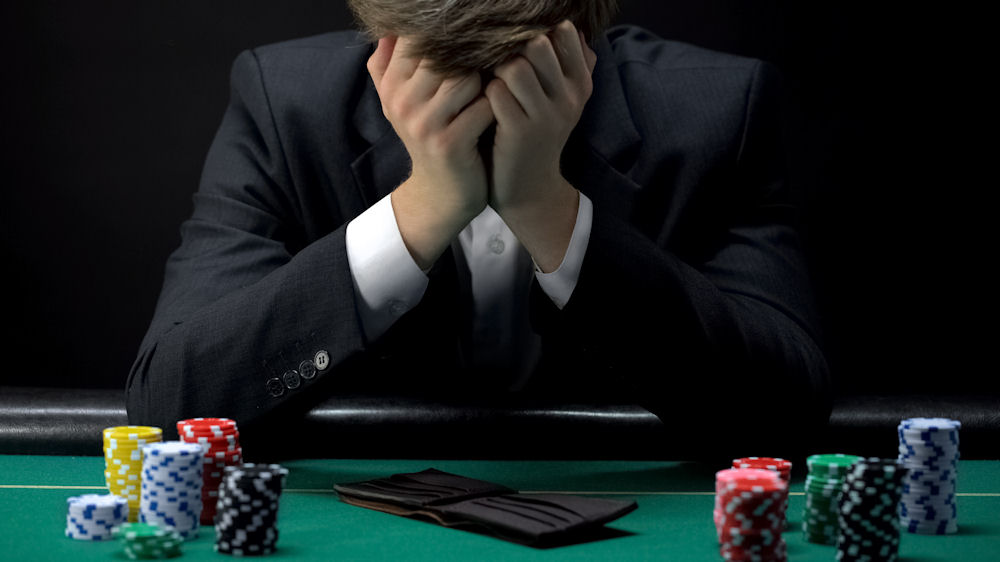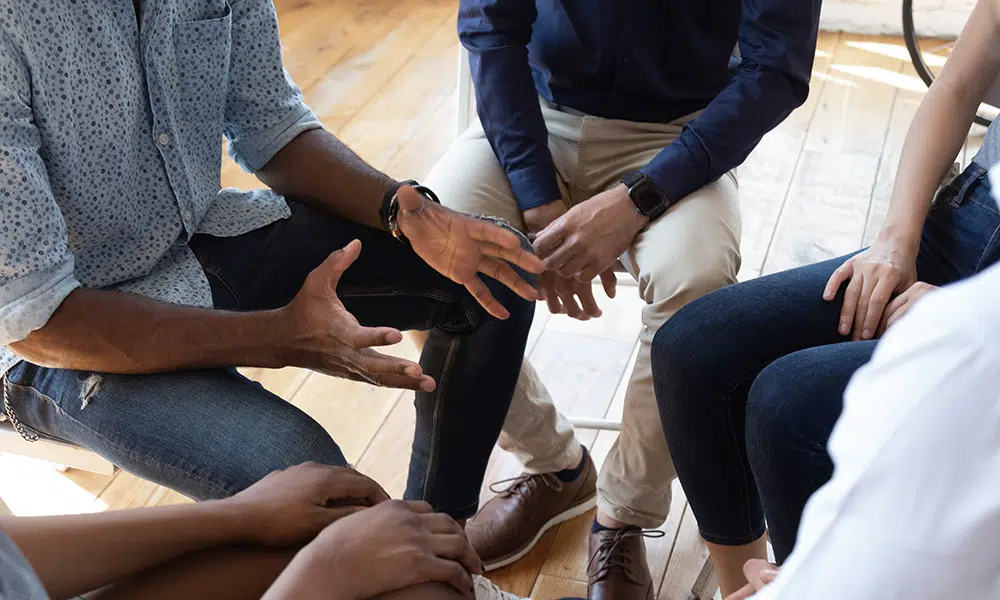Gambling Addiction Treatment Center in New Jersey
Gambling addiction is a very serious problem that many people in the United States are facing. Like any addiction, it affects the person who is gambling and also all of their loved ones around them. If you struggling to understand a loved one’s addiction-related behaviors or if you are a gambling addict and need more information, we hope to provide this below.
Whether you struggle with a process addiction or know someone who does; we hope this will provide you with a comprehensive, and helpful guide to navigating problem gambling. However, the main goal is to get you into professional treatment. We truly believe that it is never too late to take back your life.
Our team of specialists at Discovery Institute’s gambling addiction treatment center in Marlboro, New Jersey can help. Discovery Institute’s gambling addiction treatment center provides our clients with access to proper care, along with education and resources for optimal recovery outcomes. We also aim to eliminate the barriers and stigma, by closing the gap between the need for treatment and people not receiving it.
What is A Process Addiction?
Defined as a process addiction or an impulse control disorder, activities such as gambling, shopping, internet use, and sex, are forms of addiction that do not involve the consumption of drugs or alcohol. Instead, they are characterized by repetitive and compulsive behaviors that offer temporary pleasure or relief. While spending time at the casino may seem worse, any time spent obsessively doing something over time can be detrimental to your well-being. This also goes for someone with a drug or alcohol addiction.
Gambling Addiction Statistics
Gambling addiction, also known as compulsive or pathological gambling, is a behavioral disorder characterized by an uncontrollable urge to gamble despite the negative impact on one’s life.
Gambling can start as a harmless form of entertainment, but it can quickly spiral out of control for some individuals. The thrill of winning and the devastation of losing can become addictive, leading to serious consequences for both the gambler and their loved ones. Some gamblers find themselves unable to stop, risking thousands of dollars in a short time.

The high of a win can be so powerful that it drives them to keep playing, while the low of a loss pushes them to chase that feeling. This cycle of addiction is known as problem gambling or compulsive gambling. Today, this type of addiction affects people of all ages and backgrounds, with online gambling making it easier than ever to place bets.
The National Council on Problem Gambling reports that around 2.2% of adults in the United States struggle with a gambling addiction, but only a small percentage seek help. Fortunately, this is a treatable condition. Professional rehabilitation programs can help individuals break free from the cycle of addiction and regain control over their lives.
Signs and Symptoms of Problem Gambling
Regrettably, identifying these warning signs can be challenging, particularly if the individual with a gambling problem is in denial. In many households, the initial indication of a gambling issue within a family member is the sudden loss of a significant amount of money. However, there are additional indicators to be vigilant about that can help mitigate severe harm to a family’s well-being. Unlike casual gamblers, problem gamblers may exhibit the following behaviors:
- Sacrificing favorite hobbies, recreational activities, or family gatherings to engage in gambling.
- Opening new checking accounts or applying for unnecessary credit cards to obtain more money. Possessing substantial amounts of cash that subsequently vanish.
- Acting secretive or defensive regarding their gambling activities.
- Experiencing difficulties at work or conflicts in relationships due to gambling wins or losses.
- Losing control over the amount of money wagered during gambling sessions.
- Attempting unsuccessfully to quit gambling.
- They are placing increasingly larger bets or taking progressively riskier actions, such as borrowing money from illegal sources or stealing from others.
- Expressing feelings of guilt, shame, or remorse about gambling but being unable to stop.
- Requesting to borrow money from friends or family members without any apparent need for additional funds.
- Engaging in deceitful behavior regarding activities or spending habits.
- Spending excessive time online and refusing to discuss computer-related activities.
Besides the financial consequences of gambling, there are various psychological and physical repercussions, including:
- Anxiety
- Depression
- Substance abuse
- Insomnia
- Stomach issues
- Heart conditions
The significant loss of money can have a devastating impact on individuals with gambling problems. They may experience severe depression, which could potentially result in suicidal ideation, self-harming behaviors, or suicide attempts. In an attempt to cope with feelings of despair and depression, gamblers may turn to the addictive nature of gambling as a means of escaping or resolving their issues. This creates a cycle where the emotional highs and lows of gambling lead to increased risk-taking and larger bets.
CONTACT US
Find out how we can help
Our compassionate counselors are standing by to answer any questions you may have. After helping thousands of people over the last 50 years, we have the resources to help you and your family and all your individual needs.
Causes and Risk Factors of Excessive Gambling
Pathological gambling also referred to as compulsive gambling, elicits physical and emotional responses that resemble those triggered by drug or alcohol use. A significant win can stimulate the release of naturally occurring chemicals like dopamine and norepinephrine, resulting in a surge of pleasure, energy, and a sense of power and invincibility. Research cited in the Indian Journal of Psychological Medicine suggests that individuals with a gambling problem may have lower levels of norepinephrine, a chemical responsible for generating feelings of energy. The euphoria experienced from a gambling victory may compensate for the lack of such sensations in their natural chemistry.
The likelihood of developing an addiction to gambling or any other substance or process is heightened if one or more close relatives have a history of compulsive behavior or addiction. According to Alcohol Research & Health, the risk of alcoholism is up to 60 percent higher in individuals, regardless of gender, who have a family history of alcohol abuse. This genetic predisposition seems to extend to other forms of substance abuse, as well as process addictions such as gambling.
Residing in an environment where gambling is prevalent and widely accepted can increase the probability of developing compulsive tendencies. Other social factors, such as social isolation, peer pressure to gamble, or the frequent misuse of drugs or alcohol, may contribute to problem gambling. Some individuals engage in gambling as a means of combating loneliness and seeking distraction, while others may do so to alleviate stress or gain validation from their peers.
Pathological gambling is frequently observed in individuals with a concurrent mental health condition like depression, bipolar disorder, anxiety, or a substance use disorder. Impulse control disorders and attention-deficit hyperactivity disorder (ADHD) can also elevate the likelihood of developing issues with gambling.
Dangers Of A Process Addiction
While gambling addictions do not have the same detrimental effects on a person’s physical health, they still pose a large issue for a person’s well-being through mental illness, financial troubles, family issues, and even possibly getting into debt trouble.
This type of addiction differs from substance-related addictions because they do not have a definite link to deteriorating physical health. However, a person’s well-being is not completely contingent on their physical health. A person’s mental state is a large contributor to their physical health. A gambling addiction can have extremely negative impacts on a person’s mental health.
The Side Effects Of Gambling Addiction
Similar to a substance use disorder (SUD), this addiction involves a loss of control over behavior, resulting in adverse effects in various aspects of an individual’s life. Individuals with gambling addictions may prioritize gambling over responsibilities such as financial obligations, caregiving, and work. They may also exhibit withdrawal symptoms when attempting to stop gambling, along with escalating bets to recover losses. The consequences of gambling addiction extend beyond financial issues and may include:
- Compromised mental health
- Strained relationships
- Financial instability
- Legal problems
- Job loss
- Overall decline in quality of life
Moreover, the compulsive need to gamble can consume a significant amount of time and energy, leading to neglect of personal responsibilities and interests. This behavior can also have a detrimental impact on mental health.
Research shows that problem gamblers are six times more likely to attempt suicide compared to individuals with other addictions. As gambling addiction progresses, individuals may resort to desperate measures, such as facing legal consequences, losing jobs, and friendships, and filing for bankruptcy, all of which can contribute to suicidal thoughts.
How Does Gambling Affect Your Brain?

Gambling can stimulate various cognitive functions and neural networks within the brain, leading to significant effects. The release of dopamine, a neurotransmitter associated with pleasure and reinforcement, occurs when individuals experience the excitement and risk associated with gambling, resulting in a surge of adrenaline and a sense of thrill. However, for those who develop a gambling addiction, the compulsive nature of the behavior can alter the brain’s reward processing.
Continuous exposure to dopamine receptor stimulation can lead to desensitization, requiring higher levels of stimulation to achieve the same pleasurable response. Additionally, the stress response system in the brain may be activated due to the anxiety and tension caused by gambling losses, leading to increased levels of cortisol. These physiological changes have the potential to cause cognitive distortions, impaired decision-making abilities, and a greater susceptibility to addictive behaviors over time.
When a person struggles with a gambling addiction, their mind is constantly focused on gambling. This constant focus is on something very stressful, which leads a person to be stressed constantly. On top of this, if the person loses money due to their gambling addiction they could have financial issues at home. This could lead to even more stress. Thus, it is not uncommon for a person struggling with a gambling addiction to develop anxiety.
This is what is known as euphoric recall. It occurs when the problem gambler recalls the good times associating those moments with their behaviors rather than thinking of the negative consequences of these habits will be not just short-term but long-term.
Addiction Of Any Kind is A Family Disease
Another possible difficulty with gambling is family troubles. If your loved one is suffering from a gambling addiction, then consider giving them an addiction intervention. This is a great way to tell your loved one that they are loved and cared for. An intervention also allows you to encourage your family member to get treatment.
When someone struggles with a gambling addiction it could lead to financial difficulties (as previously discussed). This puts a ton of pressure on the family, especially if that person is the primary handler of money. Most addictions place financial hardship on the family, but gambling is directly related to spending. Along with this, the family can feel neglected since all the addict thinks about is gambling.
The final issue is debt. If a person gets into trouble with debt, they may find themselves unable to crawl out of that hole, could go to prison, or get into trouble with the debt-holders.
Mental Illness and Gambling Addiction
Mental illness is also a very important aspect of a gambling addiction. As previously stated, there is a definite link between anxiety and gambling. However, when a person has a mental illness and a gambling addiction, they will develop what is known as a co-occurring disorder. This is when a person has multiple mental or behavioral health disorders. This might include addiction and a mental health disorder such as depression.
Although gambling addiction is a severe and potentially hazardous disorder, it can be effectively treated using a combination of therapeutic approaches, recovery resources, and supportive psychosocial services. These treatment modalities and services are provided by professional programs that specialize in addressing excessive gambling, whether it is accompanied by a substance use disorder or not.
When a person suffers from co-occurring disorders, it is not as helpful to treat the disorders separately. This is partially because the individual’s co-occurring disorders influence each other. Many professionals are now leaning on holistic treatment, which emphasizes treating the whole person.
At the Discovery Institute, we offer dual diagnosis treatment for those who are suffering from co-occurring disorders. One cannot separate mental illness from addiction. It is extremely important to bring these issues to light because both are heavily stigmatized. Breaking the silence on addiction, mental illness, and dual diagnosis is an important way to improve recovery in the nation.
Help for Gambling Addiction
At Discovery Institute, we are dedicated to providing compassionate and evidence-based care for individuals struggling with gambling addiction. Our commitment lies in understanding the detrimental effects of gambling and guiding individuals toward a path of recovery. Our gambling addiction treatment center equips individuals with the necessary tools to combat their addiction. Through our comprehensive program, we offer both individual and group therapy sessions within a structured environment.

We’re able to gain insight into the root causes of someone’s addiction, develop healthy coping mechanisms, and learn from others in the recovery community. Our tailored treatments for gambling addiction initiate the healing process, empowering clients to face life’s challenges without resorting to gambling. Although it may seem impossible to overcome addiction while in the midst of it, we assure you that recovery is indeed possible.
Gambling addiction can cause pain to the person gambling and cost them important things like their car, their home, and their family because of the excessive money spent on gambling. It is tough for a person to stop once they have felt the rush of gambling. For this reason, a person needs to seek professional help to break harmful habits.
Treatment can be carried out in an inpatient facility, where round-the-clock supervision and support are available, or in an outpatient rehab program, which offers clients more independence and flexibility. To determine the appropriate level of care for each client and to develop a tailored treatment plan, an admission assessment will be conducted to help identify what should be included in the treatment plan.
In addition to therapy, we provide a range of personalized recovery services that address the underlying causes of this addiction that including:
This involves working one-on-one with a therapist to strengthen motivation to quit gambling, identify triggers and dysfunctional coping strategies, and learn more effective ways to deal with stress and triggers. Therapists often use modalities like Motivational Interviewing (MI), which is a collaborative approach that engages both the client and therapist in overcoming addiction.
Group therapy sessions provide a supportive network of peers who are also working towards overcoming gambling issues. In these sessions, members share personal experiences, coping strategies, and aspirations for the future. Self-help support groups like Gamblers Anonymous and other 12-step programs can also play a crucial role in a comprehensive recovery plan.
CBT focuses on addressing the self-defeating thoughts and behaviors that contribute to problem gambling. According to the Indian Journal of Psychological Medicine, CBT is particularly effective in correcting the delusional thinking associated with excessive gambling, such as the belief that one can continue to win despite repeated and devastating losses.
Family counseling is an essential component of contemporary treatment for addiction. It recognizes that addiction impacts not only the individual but the entire family unit. By involving the family in the rehab process, a more supportive environment can be created to promote sobriety and a life free from addiction. This type of therapy helps strengthen family bonds, establish boundaries, and rebuild trust.
The Importance Of A Continuing Care Plan
During the initial stages of treatment, detox may be necessary for clients struggling with drug, alcohol, and gambling addictions. Once a foundation for recovery is established, individuals may transition from inpatient to outpatient care, or even to independent living in the community. Support services provided by gambling addiction programs are crucial throughout the rehab process and into aftercare. At Discovery, we emphasize the importance of having a comprehensive continuing care plan in place for long-term success.
Contact Us Today: You’re Not Alone
The Discovery Institute wants you to know it is not too late. No matter how far in the hole you are, there is always a way out. We want you to know the best way to get help is to have our professionals at our treatment center in NJ find the root of your needs.
We have a helpful insurance guide if you are wondering whether insurance covers your treatment. On top of this, recovery is a long journey that goes one step at a time. The first step is simply reaching out. You don’t have to wait any longer; please get help by contacting us today.
Discover
Your Potential
Finding a life of happiness and sobriety is possible. You are not alone! All you need to do is take the first step.

Dr. Joseph Ranieri D.O. earned his BS in Pharmacy at Temple University School of Pharmacy in 1981 and His Doctorate Degree in Osteopathic Medicine at the Philadelphia College of Osteopathic Medicine in 1991. He is Board Certified by the American Board of Family Medicine and a Diplomate of the American Board of Preventive Medicine Addiction Certification. Dr. Ranieri has lectured extensively to physicians, nurses, counselors and laypeople about the Disease of Addiction throughout New Jersey and Pennsylvania since 2012.



